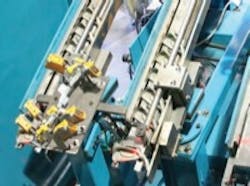Newest Advances in Casting Finishing Automation
Don't work hard: work smart. The justifications to automate what often is the most labor-intensive—and most neglected—part of the foundry have never been more compelling. Labor costs, insurance costs, quality demands, and delivery pressures are constantly on the rise, and more stringent ergonomic and environmental regulations are handed down on a regular basis. As these changes take place, the established benefits of automation become even stronger justifying factors. Reducing injuries and labor hours per ton — as well as increasing capacity, quality, and added value in the cleaning room — are critical to remaining "ahead of the curve" competitively.
Not long ago, only high-volume manufacturers could easily justify such automation. Now, however, casting finishing technology has developed to the extent that nearly everyone can benefit, from high-volume automotive to short-run jobbing foundries, no matter the alloy.
Case in point: Vulcan Engineering Co. has added a new dimension to its well-known Foxall line of casting finishing machines, making it the most comprehensive and universal system in the industry. This expanded Foxall family incorporates a series of standard products designed to automatically cut and grind gate contacts, riser pads, parting line flash, and core fins, and even perform gauging, inspection, and other value-added operations.
The standard offering now includes a choice of either "tool to part" machines (such as the Foxall Model 424FS and 636FS) or "part to tool" configurations. The system is capable of processing castings weighing as little as ounces, or as much as o several hundred pounds. Depending on the casting size and geometry, Foxall® cells can process a single casting or multiple castings per cycle, maximizing efficiency and throughput.
These proven "tool to part" solutions — designed with jobbing foundries in mind — feature the flexibility and reliability of a foundry-duty robot combined with simple, efficient casting handling and fixturing. Automatic tool-change capability is built-in, so nearly limitless tools are available on-demand. With the addition of seven axes of motion and generous operating envelopes, the result is the greatest access available for finishing castings of practically any geometry, including internals. The 424FS and 636FS can handle a wide array of ferrous and nonferrous materials, for cutting, grinding, de-burring, or all of the above.
No single solution is ideal for every application, so Vulcan Engineering Co. developed an innovative new "tool to part" system that can be tailored to today's needs and adapted as your needs change. Drawing upon years of experience in cutting, grinding, and robotics, Vulcan developed a modular system of standard components that act as building blocks for scores of different cell configurations. The nucleus of the system is an expandable common base, robot and enclosure. Standard in-feed modules (such as turntable, conveyor, vibratory rails, sliding drawers, etc.) are added to optimize ergonomics and flexibility. Standard processing modules (such as high-horsepower cut-off machines, bonded-wheel grinders, superabrasive grinders, belt grinders, de-flashing spindles, etc.) are added to optimize material removal speed and quality. Then, an out-feed module — conveyor, chute, etc. — is added to handle processed parts and scrap, if applicable). Optionally, gauging/inspection devices can be added to enhance the value of the system even further. Bottom line: Using proven standard modules, Vulcan can build a Foxall machine optimally suited for each application.
An added benefit of the flexibility designed into the new Foxall is that modules can always be added or removed. As the foundry's product mix changes (patterns come and go), the Foxall can also change to accommodate ever-changing demands on production. Modules can be simply un-bolted and interchanged, whether for in-feed, processing or out-feed. Even the processing tools themselves are flexible (for instance, a belt grinder may be converted to a bonded wheel or superabrasive grinder). After a simple program modification, the machine is quickly back in production with a fraction of the expense of a new system. Whatever fits the foundry's changing needs best, the Foxall system can now adapt.
Just as Vulcan's flexible and modular hardware enables mechanical adaptation, the highly evolved software allows fast, efficient implementation, and future control flexibility. Gone are the days when all the programming had to be done using the production machine itself. Today, the programming can be done more efficiently off-line. This feature ensures that the equipment remains in operation without sacrificing productivity. Foxall is programmed with TruTeach software, developed by Vulcan, which allows the user to trace the casting with a digitizer to teach the robot path. Now, using TruTeach can typically reduce a threeto four-hour programming job down to ten minutes. Imagine the savings to a foundry with hundreds of active patterns. This development alone can be the key to justification. Program size and storage are practically unlimited, so the system can accommodate a virtually infinite number of recipes of any complexity, all quickly accessible to meet fast-changing requirements.
When you combine the benefits of flexibility, adaptability, and ease of programming with faster cycle times, higher quality finish, reduced labor, and a safer work environment, it is hard to ignore the technology that is available today in Vulcan Engineering Co.'s Foxall system.
Kevin Crawford is director of foundry systems design and development for Vulcan Engineering Co. Visit www.vulcangroup.com for more information.
